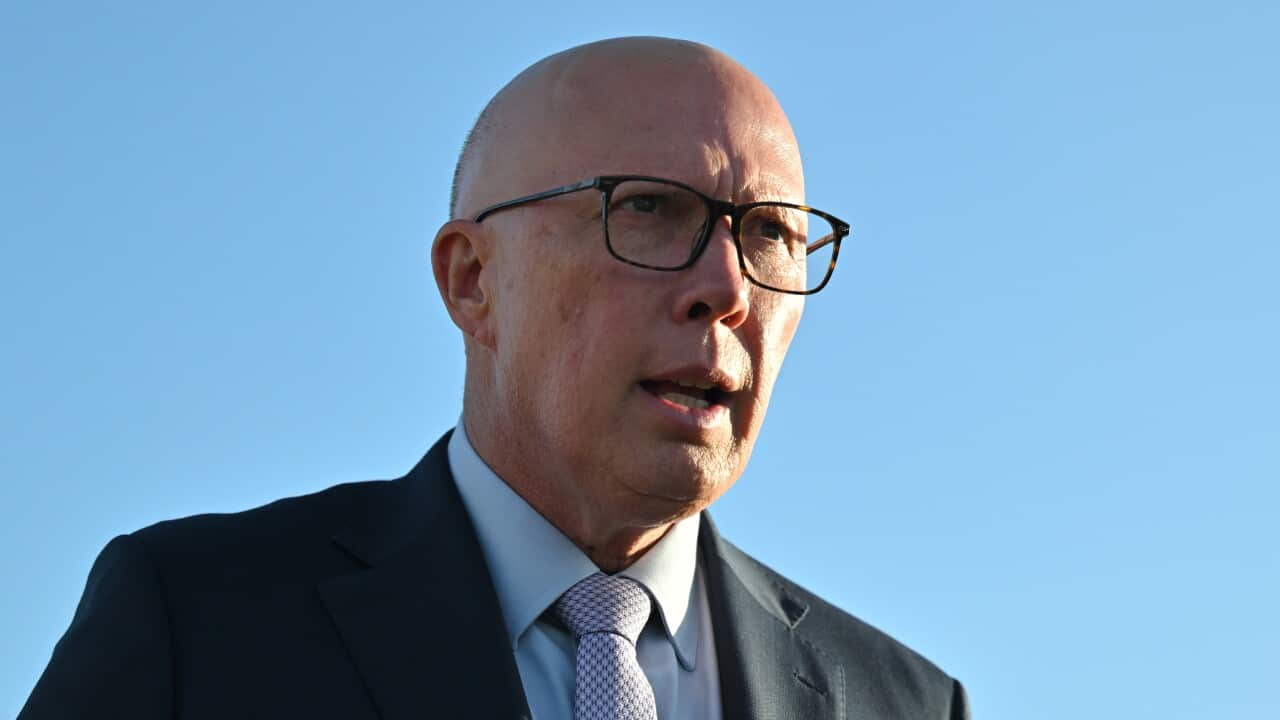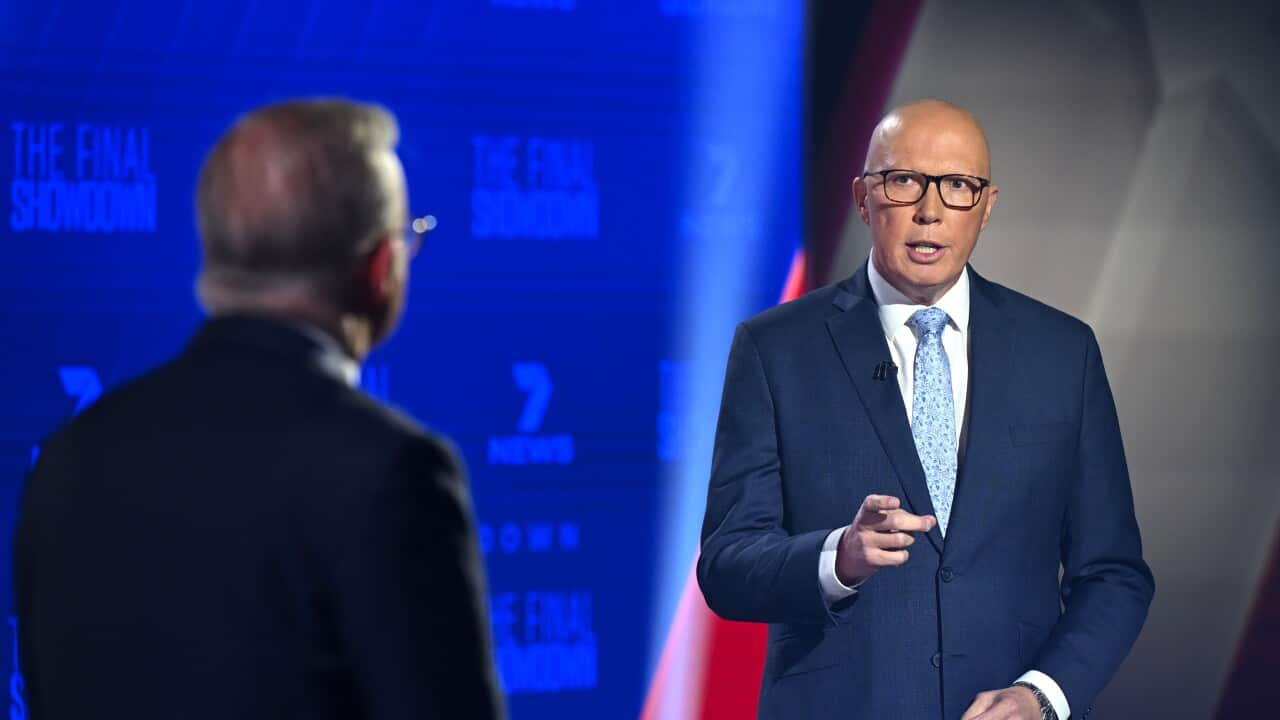Welcome to Country ceremonies are a regular feature of cultural, political, and sporting events across Australia, but they have now become a talking point in the final week of the election campaign.
On Monday, Opposition leader Peter Dutton said he does not think Welcome to Country ceremonies should be part of Anzac Day dawn services.
He said while the decision is ultimately up to organisers of events, he believes Welcome to Country ceremonies should be reserved for significant "events of our country".
"Listening to a lot of veterans in the space, Anzac Day is about our veterans, about 103,000 Australians who have died in the service of our country," he said.
"I think if you are listening to their sentiment, and we are respectful of that sentiment on Anzac Day, I think the majority view would be that they don't want it on that day."
READ MORE

What does Welcome to Country mean?
The Welcome to Country is an Indigenous ancestral cleansing ceremony to welcome someone to traditional lands.
At the Melbourne Anzac Day dawn service on Friday, Bunurong Elder Mark Brown delivered a Welcome to Country, and .
During the service, a small group of neo-Nazis shouted "we don't want to be welcomed" and "this is our country" when speakers thanked traditional owners.
Both Prime Minister Anthony Albanese and Dutton condemned the incident.
But in the on Sunday evening, Dutton said he felt Welcome to Country ceremonies have become overused across events in Australia.
"To do it for the start of every meeting at work, or the start of a football game, I think other Australians think it is overdone and cheapens the significance of what it was meant to do," he said.
"It's dividing the country, not dissimilar to what the prime minister did with the [Indigenous Voice to Parliament]."
Albanese said the ceremony was a sign of respect.
"It is up to people to determine whether they have a Welcome to Country or not, but from my perspective, for major events, it is of course a sign of respect," he said.
What is a Welcome to Country ceremony?
A Welcome to Country is a formal ceremony or ritual that takes place at the beginning of an event. It must be done by the traditional custodians of the Country, usually an Elder, who formally welcomes people onto their land.
"In the old ways, we would seek permission to enter and cross boundaries, so apart from the honouring, it's basic border control," Aunty Rhoda Roberts told SBS Examines.
"You were ensured a safe passage, and you knew who was travelling across your lands."
In a modern context, Roberts said the ceremonies also acknowledges Aboriginal and Torres Strait Islander people as the first peoples of Australia.
The term Country does not mean the country of Australia, but refers to Traditional Owners' connection to land, waterways and skies, as well as the cultural and spiritual significance of a place.
The ceremonies have been practised by Aboriginal and Torres Strait Islander peoples for thousands of years, but the term 'Welcome to Country' was coined by Roberts in the 1980s.
"It was a time to reactivate what we'd always done as protocol. Inviting the local custodian at an event to welcome us and to honour the ancestors, and pay respect to the lands that we're visiting is really important," she said.
A Welcome to Country ceremony is different from an Acknowledgement of Country, which can be delivered by anybody and is simply a statement of respect for the traditional custodians of the land.
A Welcome to Country is performed at the start of any public event and can take many forms, including a speech, smoking ceremony, dance, or musical performance.
In March, amid discussions about the cost of Welcome to Country ceremonies, Roberts told she finds the commentary frightening.
"There's room for all our voices, but what frightens me is this agenda now that this is some form of fear and divisive approach to the nation," she said.
Academic and author Professor Marcia Langton said Aboriginal and Torres Strait Islander people are regularly "targeted" in Australian elections.
"We've become the political football and we're kicked backwards and forward by political parties to exploit the racism in our community," she said.
LISTEN TO

Why are we debating Welcome to Country?
SBS English
07:45
On Monday morning, Education Minister Jason Clare told ABC News Breakfast the ceremonies are about respect.
"Remember where all of this began on Friday, it spawned out of the actions of neo-Nazis interrupting an Anzac Day Dawn Service," he said.
"I don't think any of us want to find ourselves on the same side of this argument as neo-Nazis."
Liberal senator Jane Hume also spoke to the ABC on Monday morning, and said she believes Welcome to Country ceremonies are "extremely moving" and "very important" at official ceremonies.
"However, I think we have all been at meetings where you sit around a table with a dozen people and each person has to do an acknowledgement to country before the meeting begins. When it becomes performative, I think it loses its meaning," she said.
"But a Welcome to Country ceremony at an appropriate event is entirely appropriate and extremely respectful."
Elder 'heartbroken' after Melbourne Storm cancels Welcome to Country
Discussions about Welcome to Country ceremonies and the incident at the Melbourne dawn service have now extended to sporting events.
On Friday, the Melbourne Storm NRL club cancelled a planned Welcome to Country ceremony ahead of its Anzac Day match.

Aunty Joy Murphy Wandin AO (pictured in 2021) has performed the Welcome to Country at Melbourne events for years. Source: AAP / James Ross
Wandin said she was "heartbroken", and that she had wanted to honour her father, Sapper James Henry Wandin, who fought for Australia in World War One.
In a joint statement, Wandin and the Djirri Djirri dance group said they were in shock and disbelief.
"What we do isn't a performance, it's cultural ceremony and protocol," they said.
"We strongly feel this action taken by Melbourne Storm was unnecessary and has caused us hurt and disbelief in what we thought was a good relationship."
The Storm later released a statement blaming a "miscommunication" for the cancellation.
"There was a miscommunication of expectations regarding the use [of] Welcome to Country at Melbourne Storm events throughout the year," the club said.
"We acknowledge and accept the timing and miscommunication was not ideal and we have spoken to the groups concerned this afternoon."
— Additional reporting by the Australian Associated Press
Visit the to access articles, podcasts and videos from SBS News, NITV and our teams covering more than 60 languages.




